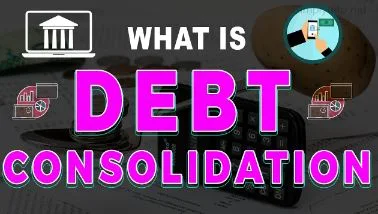Master Your Finances with Debt Consolidation | Gain Financial Freedom
Dealing with multiple debts can be overwhelming and burdensome. If you find yourself struggling to keep up with payments, debt consolidation might be the solution you need. In this comprehensive
guide, we will delve into the world of debt consolidation, exploring its benefits, steps involved, frequently asked questions, and effective strategies to help you achieve financial freedom.
What is Debt Consolidation?
Debt consolidation is a financial strategy that involves combining multiple debts into a single loan. Instead of managing various payments and interest rates, consolidation allows you to merge your debts into one, potentially reducing your monthly payments and simplifying your financial obligations.
Benefits of Debt Consolidation:
Streamlined Finances: With debt consolidation, you no longer have to juggle multiple creditors and due dates. It provides a convenient way to manage your debts by consolidating them into a single payment.
Lower Interest Rates: If you have high-interest debts, such as credit cards or payday loans, consolidating them into a lower interest rate loan can save you money in the long run. By reducing the interest, more of your payment goes towards reducing the principal balance.
Debt Payoff Timeline: Debt consolidation can help you create a structured repayment plan, allowing you to set a specific timeline for becoming debt-free. It provides a clearer path towards achieving your financial goals.
Improved Credit Score: Successfully managing a debt consolidation loan can positively impact your credit score. By making regular payments and reducing your overall debt, you demonstrate financial responsibility, which is reflected in your credit history.
Steps to Debt Consolidation:
Step 1: Assess Your Debts - Begin by compiling a list of all your debts, including the outstanding balances, interest rates, and minimum monthly payments.
Step 2: Explore Consolidation Options - Research different consolidation methods such as personal loans, balance transfer credit cards, or home equity loans. Compare interest rates, terms, and eligibility criteria to determine the best option for your situation.
Step 3: Apply for a Consolidation Loan - Once you've chosen a consolidation method, gather the necessary documents and apply for the loan. Ensure you meet the requirements and provide accurate information to increase your chances of approval.
Step 4: Repay Your Existing Debts - Upon receiving the consolidation loan, use the funds to pay off your existing debts. Notify your creditors about the consolidation and ensure all accounts are closed.
Step 5: Make Timely Payments - Stick to the repayment plan outlined by the consolidation loan. Make consistent, on-time payments to avoid penalties and further debt accumulation.
Frequently Asked Questions (FAQs):
Q1: Will debt consolidation affect my credit score?
A: Debt consolidation itself does not directly harm your credit score. However, applying for new credit may result in a temporary dip. If you make timely payments on your consolidation loan, it can actually improve your credit score over time.
Q2: Can I consolidate different types of debts?
A: Yes, debt consolidation allows you to merge various debts, including credit card balances, personal loans, medical bills, and more, into a single loan.

